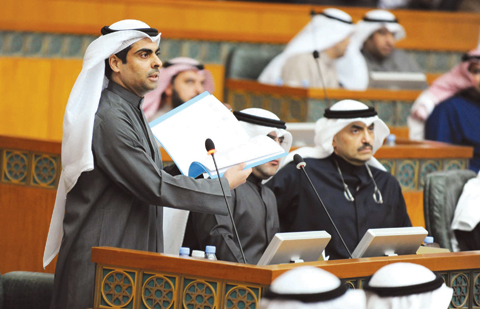 KUWAIT: MP Riyadh Al-Adasani speaks during a special session at the National Assembly yesterday. - Photo by Yasser Al-Zayyat
KUWAIT: MP Riyadh Al-Adasani speaks during a special session at the National Assembly yesterday. - Photo by Yasser Al-ZayyatKUWAIT: Opposition MP Riyadh Al-Adasani yesterday claimed that 13 former and current lawmakers had received KD 51 million in "political bribes" from the government, and demanded action. Speaking in a heated debate, Adasani showed documents he said were evidence of the highly-publicized deposits that were allegedly made in 2011 and led to the resignation of former prime minister Sheikh Nasser Al-Mohammad Al-Ahmad Al-Sabah.
Adasani was prevented by Speaker Marzouq Al-Ghanem from showing the list of names of those involved on the Assembly screen, but nevertheless, he read out the names and the amounts involved. He even named highly influential people of paying the bribes to the politicians, and in some cases, to their wives too.
The government categorically denied any involvement in the issue, which triggered large street demonstrations in 2011 and 2012 and resulted in a major political dilemma in the country. The case was investigated by the public prosecution, which decided not to press any charges against any of the accused over not finding sufficient evidence and for a legal loophole that prevented it from prosecuting those accused.
Opposition lawmakers said the case should not be considered dead because it involved an encroachment on public funds. Many of the lawmakers called for reopening the legal procedures in the case. The debate witnessed several heated arguments between MPs. Adasani clashed with MP Saleh Ashour over the need to debate the issue years after the public prosecution shelved it. Islamist opposition MP Jamaan Al-Harbash also clashed with MP Ahmad Al-Fadhl, trading accusations of corruption. At one stage, they started calling the names of their fathers, which angered Ghanem, who brought the proceedings to order.
A number of lawmakers who spoke during the brief debate strongly lashed out at the government for not doing enough to stop the spread of corruption in the country and for doing nothing to prosecute the lawmakers who received bribes. But Ashour said raising the issue now is part of political score settling and is not intended to serve justice, adding that those who have the evidence must submit it to the public prosecution, otherwise they are partners in the crime.
MP Abdulkarim Al-Kandari said the anti-corruption law includes the necessary articles to hold the lawmakers to account in court. MPs then voted to call on the Anti-Corruption Authority to accept cases related to the bribes received by MPs, starting from the 2006 Assembly. They also passed a recommendation to make the necessary amendments to the anti-corruption laws to be able to prosecute those who took the bribes.
The Assembly also entered into heated arguments when it discussed a report by the legislative committee over the controversy around the election of the deputy Assembly speaker. Several MPs criticized the report and said it was biased in favor of opposition contender Harbash, but members of the committee strongly denied the accusation. Ghanem took part in the debate and said that the issue will be settled by the constitutional court. The Assembly also agreed to move the next session from Feb 28 to March 7 because of the national holidays.
By B Izzak










